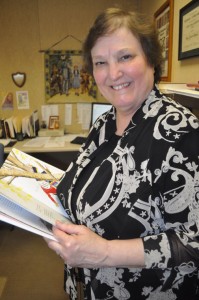Nancy Tystad Koupal’s research and writing focus on L. Frank Baum’s Aberdeen years. Her published work includes a collection of his “Our Landlady” columns that she edited and introduced, as well as her book Baum’s Road to Oz: The Dakota Years, which combines a sampling of his early writing with essays and analysis. She has written for The Baum Bugle, and unearthed for republication rare and previously unreprinted Baum poems and editorials from the Aberdeen Saturday Pioneer. She also published “Politics of Oz: A Symposium” in the journal South Dakota History. The articles published outside the Oz community help draw the attention of others to Baum and his work.
Nancy was responsible for securing the publication design of the Alexander Mitchell Public Library’s catalog of the extensive Matilda Gage collection. She recently brought Baum’s Discontented Gopher to life as a picture book. In both these projects, her critical role is largely uncredited. Nancy successfully nominated L. Frank Baum for inclusion in the South Dakota Hall of Fame and designed the permanent tribute to him at that organization’s facility.
Ozmopolitan Convention programs have featured Nancy, and she was instrumental in mounting the first annual L. Frank Baum Oz Festival in Aberdeen, South Dakota, where she served as a presenter. For it, she worked with playwright Rod Evans to develop a stage musical version of Baum’s “Our Landlady” columns. It was later performed at the Oz Club’s centennial celebration, where Nancy served as the chair of the Life and Works of L. Frank Baum educational programming track. She ably met the demanding task of designing varied Baum-centered modules that attracted a significant number of both presenters and attendees to the event.
As director of research and publishing for the South Dakota Historical Society, Nancy continues to handle media requests and work with Baum researchers interested in his years in Aberdeen—including the controversial Sitting Bull and Wounded Knee editorials, his interest in theosophy, and the Henry Littlefield populist parable.

